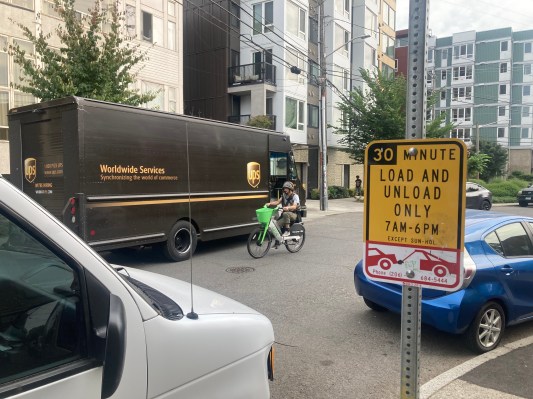Populus, the San Francisco-based transportation data startup, got its start as shared scooter mania took hold and cities tried to make sense of how infrastructure was being used by fleets of tiny vehicles.
Now, Populus co-founder and CEO Regina Clewlow is positioning the company, which collects data on transportation fleets and shares it with cities, to take advantage another hot opportunity: curbs and congestion.
Populus has continued to ride the micromobility wave and expand into other areas such as commercial fleets, ride-hail vehicles and other new mobility forms like autonomous vehicles. Its software-as-a-service product, which is now used by more than 100 cities across the U.S. and Israel, collects data on shared fleets like scooters, e-bikes and car-sharing. That data is then shared with cities to help planners and regulators understand and manage how streets are used. Cities also can use the Populus API to share information such as restrictions on motorized vehicles, preferred scooter parking areas and information on bike lanes, with mapping platforms and other third parties.
Clewlow contends the next big, and present-day growth opportunity is with Populus’s curb management feature, which gives cities data on how curbs are used so they can set dynamic pricing and free up congestion. That opportunity is being driven by rising demand for same-day and next-day delivery.
The company will use a fresh injection of $11 million venture capital raised in a Series A round to scale its existing product as well as its curb management software. The money will also be used to make key strategic hires, said Clewlow, noting that Populus hopes to double its current headcount of 25 people over the next year.
The round was co-led by Zero Infinity Partners and Climactic with participation from Comcast Ventures and Robert Downey Jr.’s FootPrint Coalition Ventures.
Populus’s curb management software “allows cities to better manage everything that moves, from commercial delivery operations to the future of autonomous vehicles,” Clewlow told TechCrunch. “Cities can receive data from fleet operators through our platform so they know where the most demand is, and then they can create new parking policies and enforce them through our platform as well.”
The data is particularly pertinent for cities trying to reduce emissions and improve air quality. While many delivery companies are trialing fleets of e-cargo bikes or autonomous sidewalk robots, most deliveries today are still completed by gas-powered trucks and vans that major are contributors of tailpipe emissions in urban areas.
Populus says its curb management software can steer fleet operators to park in areas that reduce conflict. At the same time, smarter policies backed by Populus’ curb data can incentivize delivery operators to use smaller, more carbon efficient modes of transportation.
In the future, Populus would like to focus on congestion pricing, which cities like New York are implementing to disincentivize driving in city centers.
“There’s no reason that our platform couldn’t be used to manage vehicles that are increasingly more and more connected, entering and leaving a zone and pricing them for use of those zones,” said Clewlow.
While Populus is mostly based in North America, the startup has reached as far as Tel Aviv, and is pursuing a number of pilots in major European cities, with an eye toward expansion.
